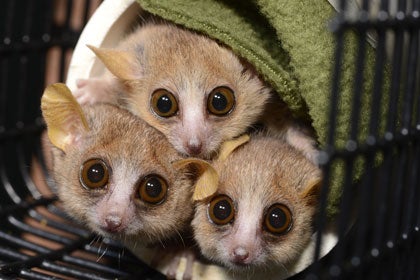
La página que intenta visitar sólo está disponible en inglés. ¡Disculpa!
The page you are about to visit is currently only available in English. Sorry!


Gray mouse lemurs at the Duke Lemur Center (Photo by David Haring via Duke Lemur Center)
Introvert or extrovert? Calm or anxious? Adrenaline junky or wallflower? These are some of the ways that we ID ourselves. But what about animals? Do they have personality types? Scientists are finding evidence that some do.
Researchers at the Duke Lemur Center in Durham, NC, did a behavioral experiment with gray mouse lemurs. Weighing less than a pair of golf balls, these primates, native to Madagascar, have rusty brown fur and enormous round eyes. They are one of 15 species studied at the Center.
The scientists set out to test whether the lemurs were bold, or demure—measuring boldness by an animal’s willingness to investigate new situations.
Placing a mix of unfamiliar toys and tiny furniture that included a little wooden chair, plastic keys, and a stuffed frog, in the animals’ enclosures, they observed the animals’ behavior. This test served as an indicator for the likely outcome of whether a lemur would tolerate being held.
If a lemur fearlessly approached or played with the new toys, it was identified as bold, and likely receptive to being handled without a fuss—suggesting that they could take this new situation in stride.
If the lemurs avoided the new playthings or approached cautiously, the scientists found that they were more likely to struggle when they were picked up—sometimes urinating or defecating on their handlers, and, in very agitated lemurs, biting. The finding indicated that new situations made those primates anxious.
“There’s actually evidence of heritability in these traits,” lead author Jennifer Verdolin told National Geographic, meaning that a lemur’s boldness or shyness may have been passed down along its family tree.
But for conservationists, the implications of varying lemur personalities may go beyond tiny chairs and bitten fingers. The shy lemurs were more rigid and inflexible, more likely to react the same way every time the researchers approached them, wrote the researchers. Thus, they suspect that inquisitive, laid-back lemurs may be better suited to adapt to changes in their environment.
Related Content:
Photos: New Species of Lemur Discovered in Madagascar
By Alisa Opar
Rail New to Science Highlights Need for Conservation
By Susan Cosier